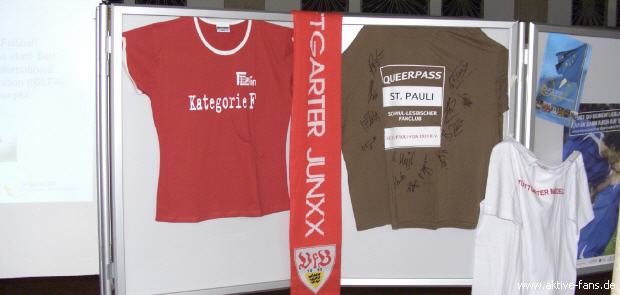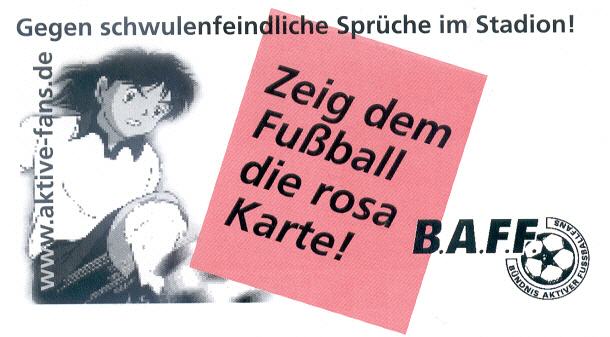Fünf-Punkte-Plan gegen Homophobie und Sexismus

| Die 5 Punkt Agenda im Kampf gegen Sexismus und Homophobie im Fußball entstand 2005 auf der FARE Konferenz "Using football for intercultural dialogue and anti-discrimination" in Bratislava. Sie wurde von der UEFA in ihren "good practise guide&" für Klubs und Verbände aufgenommen. Hier findet ihr den Plan erst in der etwas kürzeren deutschen Fassung und im Anschluß die etwas umfangreichere englische Version bzw. das Protokoll des Workshops. |
Fünf-Punkte-Plan gegen Homophobie
Das Netzwerk FARE hat 2005 in Zusammenarbeit mit der European Gay and Lesbian Sports Federation den folgenden Fünf-Punkte-Plan gegen Sexismus und Homophobie verabschiedet:
1. Sexismus und Homophobie thematisieren
Wer dagegen angehen will, muss zunächst die Tatsache anerkennen, dass es im Fussball Sexismus und Homophobie gibt.
2. Gemeinsam Verantwortung übernehmen
Anfeindungen im Zusammenhang mit Sexismus und Homophobie betreffen jeden im Fussball, nicht nur Homosexuelle und Frauen.
3. Gezielt vorgehen
Die Entwicklung des Frauenfussballs hat zu mehr Identifikationsmöglichkeiten und Respekt geführt. Homosexuelle Vorbilder könnten helfen, den Fussball von seinen Tabus zu befreien.
4. Mit gutem Beispiel vorangehen
Die Vielfalt im Fussball als Selbstverständlichkeit präsentieren, z.B. indem regelmässig über Frauenfussball und die Beteiligung von Schwulen und Lesben berichtet wird.
5. Homophobie öffentlich machen
Jede Art von Anfeindung sollte gemeldet werden, damit Sanktionen gegen den Übeltäter bzw. die betreffende Einrichtung ergriffen werden können.
Results of workshop C (Anti-Discrimination)
Results of workshop C (Anti-Discrimination)
How to challenge different forms of discrimination: sexism and homophobia
Input: Nicole Selmer, Network Women in Football (F_in), Hamburg, Germany
Jose Garcia Vazquez, General Secretary, European Gay and Lesbian Sports Federation (EGLSF), Brussels, Belgium
Workshop facilitator and report: Heidi Thaler, FairPlay. Different Colours. One Game/vidc,
FARE coordination office in Vienna, Austria
Homophobia and sexism are widely spread in football sport. Even though the two subjects are quite different there are some common problems that can be stated: the problem of awareness and the lack of visibility in a hyper-masculine football culture. Our common aim is to create more sensibility towards sexism and homophobia. Developing an alternative culture of football.
5 point agenda in the fight against sexism and homophobia in football:
1) Establish sexism and homophobia as a topic – name the problem:
Gay and lesbian football players and supporters do exist. Female football players and supporters do exist. They are part of the game. They experience discrimination at all levels of the game – every day. It is our responsibility to deliver this message to all the football family.
2) Take responsibility – make it everybodies problem:
The FARE network agrees that racism is not only the problem of black people or ethnic minorities but of everyone of us. We are all victims of racism. Discussing sexism and homophobia, it is still a common opinion that sexism is a problem of women and homophobia a problem of gays and lesbians. It has to be clear that all of us are victims of sexism, that all of us are victims of homophobia and that we will all join in combating these discriminations.
3) Setting a focus on sexism and homophobia in our daily work:
Focusing on and supporting women football will help to create more identification among supporters, club officials and football authorities with their women football section. Identification leads to respect. The gay and lesbian community will highly profit on homosexual role models among football players. It is our responsibility to create a safety net for players willing to announce their homosexuality, to offer them protection and a strong backing.
4) Point out positive examples:
There are already initiatives and projects dealing with sexism and homophobia in football – combating them through positive intervention. By presenting and supporting these actors in the FARE partners publications, papers and programmes it is possible to create an advanced view on the diversity of football sport. E.g. reports and interviews with female and homosexual players, gay and lesbian football clubs and tournaments, girls and women football projects and teams in the FARE partners magazines.
5) Reporting on sexism and homophobia:
Sexism and homophobia accompany football every day. Most of the time such discriminations are silently accepted. It is our responsibility to break this silence and point out clearly where and when sexism and homophobia take place. Starting off with one weekend a year, when FARE members, partners and friends are called to report on sexist and homophobic incidence happening at their club, in their town and country. The reported cases will be summarised and published by the FARE coordination office in Vienna.
